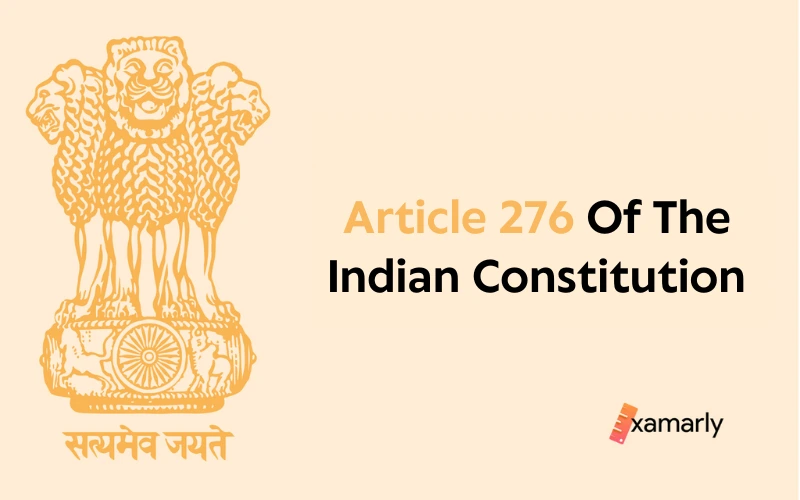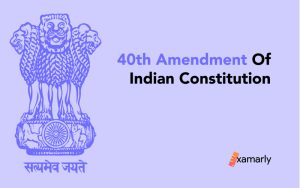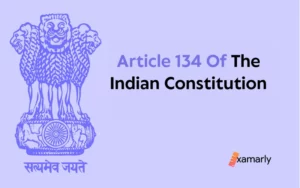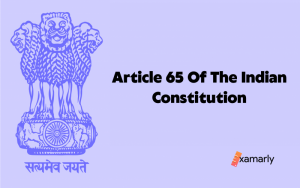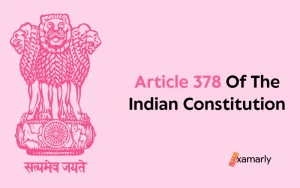An Overview
The Indian Constitution is a complex document that lays out the framework for the governance of the country. One of its key provisions is Article 276, which deals with the imposition and distribution of taxes between the Union government and the State governments.
In this blog post, we will take a closer look at Article 276 of the Indian Constitution and explore its various clauses in detail. We will examine the legislative powers of the Union and State governments with respect to taxes on professions, trades, callings and employments, and the limits placed on these powers.
We will also delve into the specific provisions of the article that deal with the distribution of tax proceeds and the protection of State laws relating to taxes on income. Understanding Article 276 of the Indian Constitution is crucial for anyone who wants to gain a deeper understanding of the Indian tax system and the interplay between the Union and State governments.
- An Overview
- Article 276 Of The Indian Constitution: Provisions Related To Taxes On Professions, Trades, Callings And Employments
- Background Of Article 276 Of The Indian Constitution
- Clause (1) Of Article 276 Of The Indian Constitution: Explained
- Clause (2) Of Article 276 Of The Indian Constitution: Explained
- Clause (3) Of Article 276 Of The Indian Constitution: Explained
- Summing Up
- FAQs Related To Article 276 Of The Indian Constitution
- What Article Is Mentioned In Clause (1) Of Article 276 Of The Indian Constitution And What Does It Deal With?
- What Does Article 276 Of The Indian Constitution Deal With?
- What Is The Limit On The Amount Of Taxes That Can Be Imposed On A Person For Professions, Trades, Callings And Employments In A State?
- How Does Article 276 Of The Indian Constitution Deal With The Power Of The State Legislature And The Union Government With Respect To Taxes On Professions, Trades, Callings And Employments?
- Can State Laws Relating To Taxes On Income Be Challenged On The Grounds That They Relate To A Tax On Income?
- Are There Any Restrictions On The Power Of The State Government To Make Laws Regarding Taxes On Professions, Trades, Callings And Employments?
Article 276 Of The Indian Constitution: Provisions Related To Taxes On Professions, Trades, Callings And Employments
Article 276 of the Indian Constitution deals with the imposition and distribution of taxes by the Union government and the State government. It is held in Part XII of Chapter I of the Constitution of India. It lays down that taxes on professions, trades, callings and employments shall be levied and collected by the State government and the Union government shall have the power to levy taxes on certain other specified matters like taxes on the sale or purchase of goods, subject to certain conditions.
The article also specifies that the proceeds of such taxes shall be divided between the Union government and the State government as prescribed by the Parliament.
Background Of Article 276 Of The Indian Constitution
Before going deep into the provisions of Article 276, let us first get to know a little bit about the background of the article.
- Draft Article 256 was introduced and debated in the Constituent Assembly for Article 276 of the Indian Constitution. It was debated on August 9, 1949.
- It empowers the State Legislatures to make laws on specific subjects and also states that this power does not limit the taxation powers of the Parliament.
- In addition to this, the Draft Article also had another purpose. It established a maximum limit on the amount of money a person is responsible for paying to the State or any other local authority.
- A member proposed that the upper limit for the total amount payable by one person to the State or other authority should be changed to ‘one percent of their annual income’ or ‘one thousand rupees’ as a source of income for local bodies and to reduce the burden on the poor.
- The proposed amendment was opposed by multiple members. A member argued that it would be an encroachment on the taxation powers of the Centre and source of revenue or, the income tax.
- The Chairman of the Drafting Committee also rejected the amendment. He argued that the Draft Article was only an exception to the larger principle that the Constitution would not make any mention of how financial resources would be allocated to the local bodies. This would be decided by the States.
- The suggestion was finally rejected. Draft Article 256 was then adopted into the Constitution of India. It was done on August 9, 1949.
Clause (1) Of Article 276 Of The Indian Constitution: Explained
(1) Notwithstanding anything in article 246, no law of the Legislature of a State relating to taxes for the benefit of the State or of a municipality, district board, local board or other local authority therein in respect of professions, trades, callings or employments shall be invalid on the ground that it relates to a tax on income.
Clause (1) of Article 276 of the Indian Constitution states that, despite anything stated in Article 246 of the Indian Constitution, which outlines the distribution of legislative powers between the Union government and the State governments, any law passed by a State legislature regarding taxes for the benefit of the State or local authorities (such as a municipality, district board, local board) in relation to professions, trades, callings, or employments shall not be considered invalid simply because it relates to a tax on income.
In other words, the State governments have the power to levy taxes on income for the benefit of the State or local authorities, and these laws cannot be challenged on the grounds that they relate to a tax on income.
Clause (2) Of Article 276 Of The Indian Constitution: Explained
(2) The total amount payable in respect of any one person to the State or to any one municipality, district board, local board or other local authority in the State by way of taxes on professions, trades, callings and employments shall not exceed [two thousand and five hundred rupees] per annum.
Clause (2) of Article 276 of the Indian Constitution sets a limit on the amount of taxes that can be imposed by the State government or any local authority (such as a municipality, district board, or local board) on a person for professions, trades, callings and employments.
It states that the total amount of taxes that can be imposed on any one person in a State for any of these subjects, by the State government or any local authority, shall not exceed a certain specified amount, which is currently 2,500 rupees per annum.
This means that the maximum amount of taxes that can be imposed on a person for professions, trades, callings and employments in a State shall not be more than 2,500 rupees per year.
This amount was specified in the clause by the Constitution (Sixtieth Amendment) Act, 1988.
Clause (3) Of Article 276 Of The Indian Constitution: Explained
(3) The power of the Legislature of a State to make laws as aforesaid with respect to taxes on professions, trades, callings and employments shall not be construed as limiting in any way the power of Parliament to make laws with respect to taxes on income accruing from or arising out of professions, trades, callings and employments.
Clause (3) of Article 276, which is also the final clause is related to the legislative powers of the State government and the Union government with respect to taxes on professions, trades, callings and employments.
This clause talks about the relationship between the power of the State legislature to make laws and the power of the Union government to make laws, specifically in relation to taxes. The clause states that the State legislature has the power to make laws regarding taxes on professions, trades, callings, and employments. However, this power should not be seen as limiting or restricting in any way the power of the Union government to make laws regarding taxes on income that comes from professions, trades, callings and employments.
In other words, while the State government has the power to make laws regarding taxes on professions, trades, callings, and employments, this power does not restrict or limit the power of the Union government to make laws regarding taxes on income from these same subjects.
You Might Also Like:
| Article 274 Of The Indian Constitution | Article 275 Of The Indian Constitution |
| Article 277 Of The Indian Constitution | Article 278 Of The Indian Constitution |
Summing Up
After going through the provisions contained in the clauses of Article 276 of the Indian Constitution, we can come to the following conclusions:
- Article 276 of the Indian Constitution deals with the imposition and distribution of taxes by the Union government and the State government.
- Taxes on professions, trades, callings and employments are levied and collected by the State government and the Union government has the power to levy taxes on certain other specified matters like taxes on the sale or purchase of goods, subject to certain conditions.
- The proceeds of such taxes are divided between the Union government and the State government as prescribed by the Parliament.
- Clause (1) of Article 276 states that State laws relating to taxes for the benefit of the State or local authorities in respect of professions, trades, callings or employments shall not be invalid on the ground that it relates to a tax on income.
- Clause (2) of Article 276 sets a limit on the amount of taxes that can be imposed on a person for professions, trades, callings and employments in a State, which is currently 2,500 rupees per annum.
- Clause (3) of Article 276 states that the power of the State legislature to make laws regarding taxes on professions, trades, callings, and employments shall not be considered as limiting in any way the power of the Union government to make laws regarding taxes on income that accrues or arises from professions, trades, callings, and employments.
FAQs Related To Article 276 Of The Indian Constitution
What Article Is Mentioned In Clause (1) Of Article 276 Of The Indian Constitution And What Does It Deal With?
Article 246 is mentioned in clause (1) of Article 276 of the Indian Constitution.
Article 246 deals with the distribution of legislative powers between the Union government and the State governments. It lays out the subjects on which Parliament and the State Legislatures can make laws, and also specifies which level of government has the power to make laws on certain subjects.
What Does Article 276 Of The Indian Constitution Deal With?
Article 276 of the Indian Constitution deals with the imposition and distribution of taxes by the Union government and the State government. It lays down that taxes on professions, trades, callings and employments shall be levied and collected by the State government and the Union government shall have the power to levy taxes on certain other specified matters like taxes on the sale or purchase of goods.
What Is The Limit On The Amount Of Taxes That Can Be Imposed On A Person For Professions, Trades, Callings And Employments In A State?
The total amount of taxes that can be imposed on any one person in a State for any of these subjects, by the State government or any local authority, shall not exceed 2,500 rupees per annum.
How Does Article 276 Of The Indian Constitution Deal With The Power Of The State Legislature And The Union Government With Respect To Taxes On Professions, Trades, Callings And Employments?
As per clause (3) of Article 276 of the Indian Constitution, the State government has the power to make laws about taxes on certain things like professions, trades, callings, and employment. However, this does not limit the power of the Union government to make laws about taxes on income from those same things.
Can State Laws Relating To Taxes On Income Be Challenged On The Grounds That They Relate To A Tax On Income?
No, the State laws relating to taxes for the benefit of the State or of a municipality, district board, local board or other local authority in respect of professions, trades, callings or employments shall not be invalid on the ground that it relates to a tax on income.
Are There Any Restrictions On The Power Of The State Government To Make Laws Regarding Taxes On Professions, Trades, Callings And Employments?
The power of the State government to make laws regarding tax on professions, trades, callings and employments is subject to certain conditions laid down in the Article 276 of the Indian Constitution.


